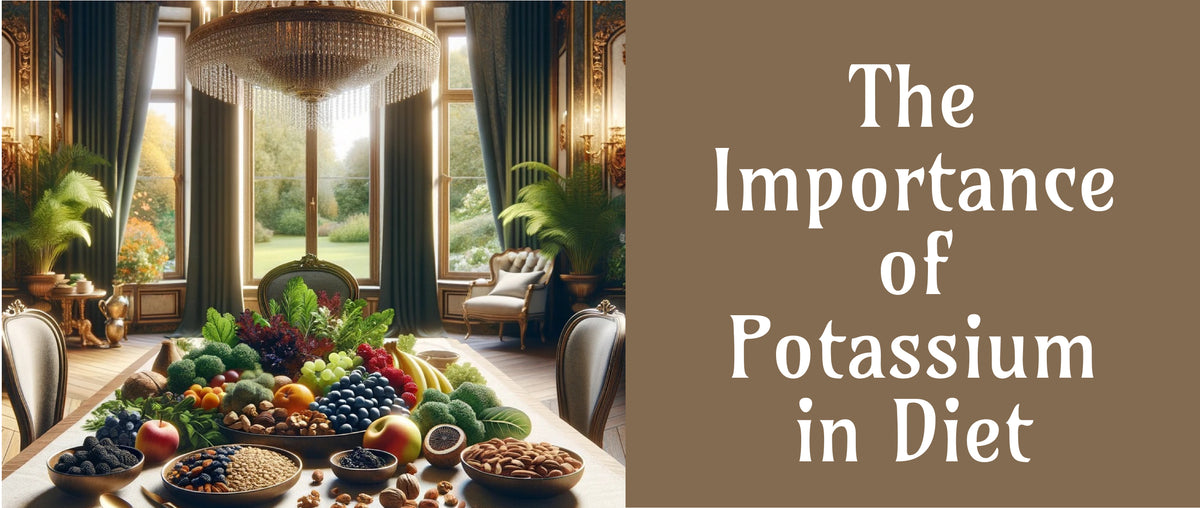The Importance of Potassium in Diet
Potassium is a vital mineral that plays a key role in maintaining several critical bodily functions. It's essential for muscle contraction, nerve function, and fluid balance. Despite its importance, many people do not consume enough potassium in their healthy diet. This article delves into the importance of potassium, its benefits, sources, and how to maintain optimal levels for overall health.
Key Takeaways
- Potassium is essential for muscle, heart, and nerve function.
- The recommended daily intake varies by age and gender.
- Potassium-rich foods include fruits, vegetables, nuts, seeds, legumes, and dairy products.
- Both deficiency and overdose of potassium can lead to serious health issues.
- Maintaining optimal potassium levels is crucial for overall health, particularly for heart, blood pressure, and kidney function.
What is Potassium?
Potassium is an essential mineral and electrolyte necessary for the proper function of all cells, tissues, and organs in the body. It helps to regulate heartbeat, ensure proper muscle and nerve function, and is vital for synthesizing protein and metabolizing carbohydrates.
The Importance of Potassium in Diet
Benefits of Potassium
- Muscle Function: Potassium is crucial for muscle function. It helps muscles contract and supports muscle recovery after exercise. Proper potassium levels are essential for athletes and those engaged in regular physical activity to prevent cramps and promote muscle recovery.
- Heart Function: Potassium plays a significant role in maintaining a healthy heart. It helps to regulate heartbeats and ensures that the heart functions efficiently. Adequate potassium intake is linked to a reduced risk of heart disease.
- Nerve Function: Potassium is essential for nerve function. It helps transmit electrical impulses in the body, which are necessary for muscle contractions and other bodily functions.
- Fluid Balance: Potassium helps maintain fluid balance in the body by regulating the amount of sodium in the cells. This balance is crucial for maintaining healthy blood pressure levels.

Recommended Daily Intake
The recommended daily intake of potassium varies by age and gender. Here is a breakdown based on current guidelines:
| Age Group | Recommended Daily Intake |
|---|---|
| Infants (0-6 months) | 400 mg |
| Infants (7-12 months) | 700 mg |
| Children (1-3 years) | 3,000 mg |
| Children (4-8 years) | 3,800 mg |
| Adolescents (9-13 years) | 4,500 mg |
| Adults (14+ years) | 4,700 mg |
| Pregnant Women | 4,700 mg |
| Breastfeeding Women | 5,100 mg |
Sources of Potassium
Top Potassium-Rich High Protein Vegan Food
Incorporating potassium-rich foods into your vegan diet can help you meet your daily intake requirements. Here are some of the best sources:
- Fruits: Bananas, oranges, apricots, and strawberries.
- Vegetables: Spinach, broccoli, sweet potatoes, and tomatoes.
- Nuts and Seeds: Almonds, sunflower seeds, and flaxseeds.
- Legumes: Beans, lentils, and chickpeas.
- Dairy Products: Yogurt and milk.
Potassium Supplements
While it's best to get potassium from food sources, supplements can be helpful in certain situations:
- When to Consider Supplements: Potassium supplements are usually recommended when dietary intake is insufficient, or for individuals with medical conditions that cause potassium loss.
- Types of Potassium Supplements: Potassium chloride, potassium citrate, and potassium gluconate.
- Risks and Benefits: Supplements can help maintain adequate potassium levels but should be used under medical supervision to avoid the risk of hyperkalemia (excess potassium).
Effects of Potassium Deficiency
Symptoms of Low Potassium
Potassium deficiency, also known as hypokalemia, can cause several health issues. Common symptoms include:
- Fatigue
- Muscle cramps
- Weakness
- Digestive issues
Causes of Potassium Deficiency
Several factors can lead to potassium deficiency:
- Poor diet lacking in potassium-rich foods.
- Medical conditions such as chronic kidney disease and certain digestive disorders.
- Medications that increase potassium excretion, such as diuretics.

Effects of Potassium Overdose
Symptoms of High Potassium
Hyperkalemia, or high potassium levels, can be dangerous and may cause:
- Irregular heartbeat
- Nausea
- Weakness
Causes of Potassium Overdose
Hyperkalemia can be caused by:
- Excessive intake of potassium supplements.
- Medical conditions affecting kidney function.
- Certain medications that affect potassium levels.
Potassium and Health Conditions
Potassium and Heart Health
Potassium plays a crucial role in heart health by:
- Helping to regulate heart function.
- Reducing the risk of heart disease through adequate intake.
Potassium and Blood Pressure
Potassium helps manage blood pressure by:
- Counteracting the effects of sodium.
- Relaxing blood vessel walls.
Potassium and Kidney Health
Maintaining proper potassium levels is essential for kidney health. It helps:
- Manage fluid balance.
- Prevent kidney stones.
Individuals with kidney disease must monitor their potassium intake carefully to avoid complications.
How to Maintain Optimal Potassium Levels
Dietary Tips
To maintain optimal potassium levels:
- Incorporate a variety of potassium-rich foods into your daily diet.
- Balance potassium intake with other electrolytes like sodium and magnesium.
Monitoring Potassium Levels
Regular monitoring of potassium levels is essential, especially for those with health conditions that affect potassium balance. Blood tests can help determine if potassium levels are within the normal range.
Conclusion
Potassium is a vital nutrient that supports many essential bodily functions, including muscle, heart, and nerve function, as well as fluid balance. Consuming a balanced diet rich in potassium can help maintain optimal health and prevent deficiencies. By understanding the importance of potassium and incorporating potassium-rich foods into your diet, you can support your overall well-being and reduce the risk of health issues associated with potassium imbalance.








